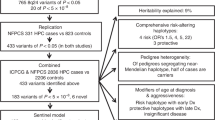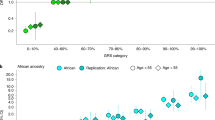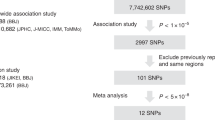Abstract
We performed a genome-wide association scan to search for sequence variants conferring risk of prostate cancer using 1,501 Icelandic men with prostate cancer and 11,290 controls. Follow-up studies involving three additional case-control groups replicated an association of two variants on chromosome 17 with the disease. These two variants, 33 Mb apart, fall within a region previously implicated by family-based linkage studies on prostate cancer. The risks conferred by these variants are moderate individually (allele odds ratio of about 1.20), but because they are common, their joint population attributable risk is substantial. One of the variants is in TCF2 (HNF1β), a gene known to be mutated in individuals with maturity-onset diabetes of the young type 5. Results from eight case-control groups, including one West African and one Chinese, demonstrate that this variant confers protection against type 2 diabetes.
This is a preview of subscription content, access via your institution
Access options
Subscribe to this journal
Receive 12 print issues and online access
$209.00 per year
only $17.42 per issue
Buy this article
- Purchase on Springer Link
- Instant access to full article PDF
Prices may be subject to local taxes which are calculated during checkout

Similar content being viewed by others
References
Amundadottir, L.T. et al. A common variant associated with prostate cancer in European and African populations. Nat. Genet. 38, 652–658 (2006).
Gudmundsson, J. Genome-wide association study identifies a second prostate cancer susceptibility variant at 8q24. Nat. Genet. 39, 631–637 (2007).
Haiman, C.A. et al. Multiple regions within 8q24 independently affect risk for prostate cancer. Nat. Genet. 39, 638–644 (2007).
Yeager, M. et al. Genome-wide association study of prostate cancer identifies a second risk locus at 8q24. Nat. Genet. 39, 645–649 (2007).
Roeder, K., Bacanu, S.A., Wasserman, L. & Devlin, B. Using linkage genome scans to improve power of association in genome scans. Am. J. Hum. Genet. 78, 243–252 (2006).
Lange, E.M. et al. Genome-wide scan for prostate cancer susceptibility genes using families from the University of Michigan prostate cancer genetics project finds evidence for linkage on chromosome 17 near BRCA1. Prostate 57, 326–334 (2003).
Xu, J. et al. A combined genomewide linkage scan of 1,233 families for prostate cancer-susceptibility genes conducted by the international consortium for prostate cancer genetics. Am. J. Hum. Genet. 77, 219–229 (2005).
Lange, E.M. et al. Fine-mapping the putative chromosome 17q21–22 prostate cancer susceptibility gene to a 10 cM region based on linkage analysis. Hum. Genet. 121, 49–55 (2007).
Zuhlke, K.A. et al. Truncating BRCA1 mutations are uncommon in a cohort of hereditary prostate cancer families with evidence of linkage to 17q markers. Clin. Cancer Res. 10, 5975–5980 (2004).
Kraft, P. et al. Genetic variation in the HSD17B1 gene and risk of prostate cancer. PLoS Genet 1, e68 (2005).
White, K.A., Lange, E.M., Ray, A.M., Wojno, K.J. & Cooney, K.A. Prohibitin mutations are uncommon in prostate cancer families linked to chromosome 17q. Prostate Cancer Prostatic Dis. 9, 298–302 (2006).
Bellanne-Chantelot, C. et al. Large genomic rearrangements in the hepatocyte nuclear factor-1beta (TCF2) gene are the most frequent cause of maturity-onset diabetes of the young type 5. Diabetes 54, 3126–3132 (2005).
Edghill, E.L., Bingham, C., Ellard, S. & Hattersley, A.T. Mutations in hepatocyte nuclear factor-1beta and their related phenotypes. J. Med. Genet. 43, 84–90 (2006).
Kasper, J.S. & Giovannucci, E. A meta-analysis of diabetes mellitus and the risk of prostate cancer. Cancer Epidemiol. Biomarkers Prev. 15, 2056–2062 (2006).
Winckler, W. et al. Evaluation of common variants in the six known maturity-onset diabetes of the young (MODY) genes for association with type 2 diabetes. Diabetes 56, 685–693 (2007).
HillHarfe, K.L. et al. Fine mapping of chromosome 17 translocation breakpoints > or = 900 Kb upstream of SOX9 in acampomelic campomelic dysplasia and a mild, familial skeletal dysplasia. Am. J. Hum. Genet. 76, 663–671 (2005).
Risch, N. Linkage strategies for genetically complex traits. I. Multilocus models. Am. J. Hum. Genet. 46, 222–228 (1990).
Gulcher, J.R., Kristjansson, K., Gudbjartsson, H. & Stefansson, K. Protection of privacy by third-party encryption in genetic research in Iceland. Eur. J. Hum. Genet. 8, 739–742 (2000).
Kutyavin, I.V. et al. A novel endonuclease IV post-PCR genotyping system. Nucleic Acids Res. 34, e128 (2006).
Gretarsdottir, S. et al. The gene encoding phosphodiesterase 4D confers risk of ischemic stroke. Nat. Genet. 35, 131–138 (2003).
Falk, C.T. & Rubinstein, P. Haplotype relative risks: an easy reliable way to construct a proper control sample for risk calculations. Ann. Hum. Genet. 51, 227–233 (1987).
Mantel, N. & Haenszel, W. Statistical aspects of the analysis of data from retrospective studies of disease. J. Natl. Cancer Inst. 22, 719–748 (1959).
Devlin, B. & Roeder, K. Genomic control for association studies. Biometrics 55, 997–1004 (1999).
Acknowledgements
We thank the research subjects whose contribution made this work possible. We also thank the nurses at Noatun (deCODE's sample recruitment center) and personnel at the deCODE core facilities. This project was funded in part by contract number 018827 (Polygene) from the 6th Framework Program of the European Union and by US Department of Defense Congressionally Directed Medical Research Program W81XWH-05-1-0074. Support for the Africa America Diabetes Mellitus (AADM) study is provided by multiple institutes of the US National Institutes of Health: the National Center on Minority Health and Health Disparities (3T37TW00041-03S2), National Institute of Diabetes and Digestive and Kidney (DK072128), the National Human Genome Research Institute and the National Center for Research Resources (RR03048). The Scottish Diabetes case control study was funded by the Wellcome Trust. C.N.A.P. and A.M. are supported by the Scottish Executive Generation Scotland Initiative. The Hong Kong Diabetes case control study was supported by the Hong Kong Research Grants Committee Central Allocation Scheme CUHK 1/04C.
Author information
Authors and Affiliations
Corresponding authors
Ethics declarations
Competing interests
J.G., P.S., V.S., J.T.B., G.T., A.M., T.R., D.G., A.B., A.S., M.J., T.B., S.N.S., A.H., S. Gunnarsdottir, A.O., K.T.K., B.B., S. Ghosh, S.T., D.M., G.S., K.K., M.L.F., J.R.G., U.T., A.K. and K.S. are shareholders in deCODE genetics, Inc.
Supplementary information
Supplementary Text and Figures
Methods, Note, Tables 1–3 and Fig 1 (PDF 123 kb)
Rights and permissions
About this article
Cite this article
Gudmundsson, J., Sulem, P., Steinthorsdottir, V. et al. Two variants on chromosome 17 confer prostate cancer risk, and the one in TCF2 protects against type 2 diabetes. Nat Genet 39, 977–983 (2007). https://doi.org/10.1038/ng2062
Received:
Accepted:
Published:
Issue Date:
DOI: https://doi.org/10.1038/ng2062
This article is cited by
-
Extensive germline-somatic interplay contributes to prostate cancer progression through HNF1B co-option of TMPRSS2-ERG
Nature Communications (2022)
-
The Role of Hexokinase Domain Containing Protein-1 in Glucose Regulation During Pregnancy
Current Diabetes Reports (2021)
-
Type 2 diabetes susceptibility genes on mouse chromosome 11 under high sucrose environment
BMC Genetics (2020)
-
HNF1B-mediated repression of SLUG is suppressed by EZH2 in aggressive prostate cancer
Oncogene (2020)
-
Diabetes mellitus and cancer incidence: the Atherosclerosis Risk in Communities (ARIC) cohort study
Journal of Diabetes & Metabolic Disorders (2019)



